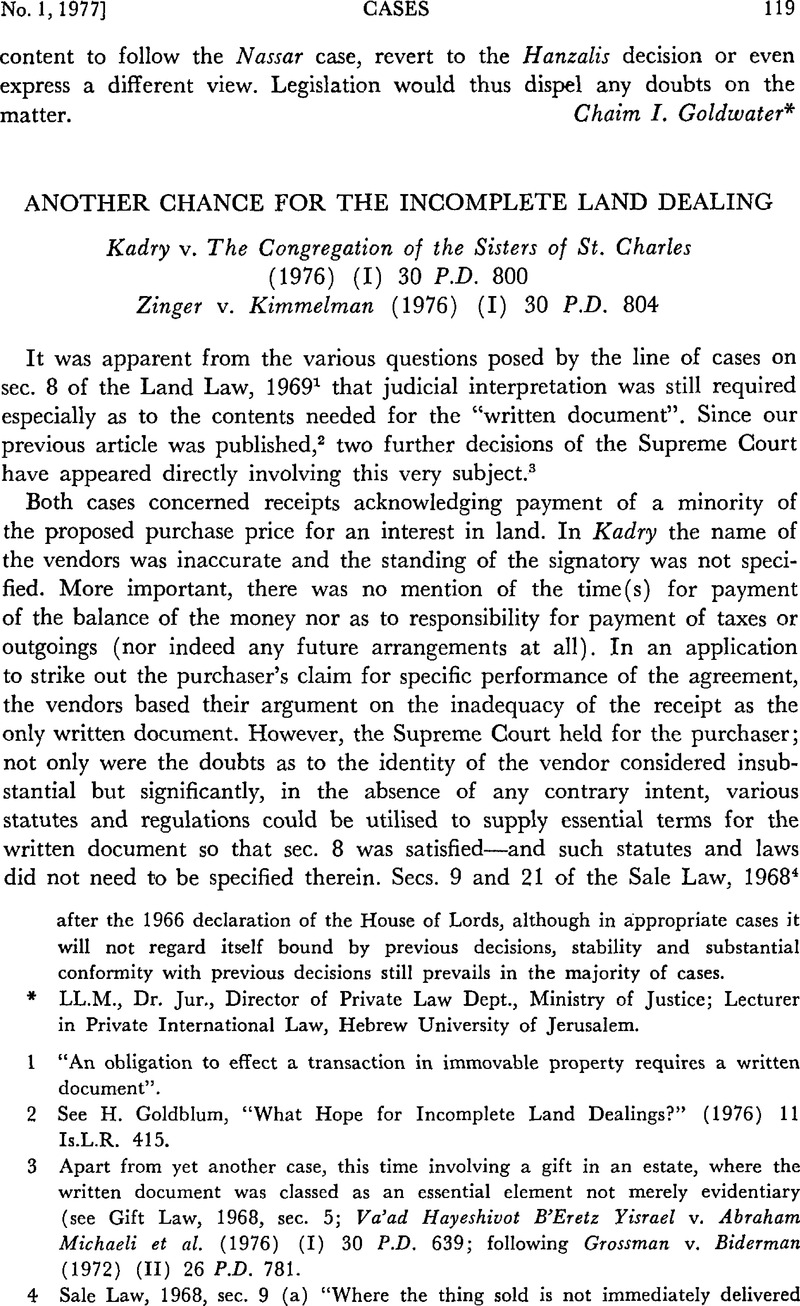No CrossRef data available.
Article contents
Another Chance for the Incomplete Land Dealing
Published online by Cambridge University Press: 12 February 2016
Abstract

- Type
- Cases
- Information
- Copyright
- Copyright © Cambridge University Press and The Faculty of Law, The Hebrew University of Jerusalem 1977
References
1 “An obligation to effect a transaction in immovable property requires a written document”.
2 See Goldblum, H., “What Hope for Incomplete Land Dealings?” (1976) 11 Is.L.R. 415.Google Scholar
3 Apart from yet another case, this time involving a gift in an estate, where the written document was classed as an essential element not merely evidentiary (see Gift Law, 1968, sec. 5; Va'ad Hayeshivot B'Eretz Yisrael v. Abraham Michaeli et al. (1976) (I) 30 P.D. 639; following Grossman v. Biderman (1972) (II) 26 P.D. 781.
4 Sale Law, 1968, sec. 9 (a) “Where the thing sold is not immediately delivered it shall be delivered within a reasonable time after the conclusion of the contract”. (c) … “the seller shall give the buyer reasonable advance notice of the date of delivery”. Sec. 21. “The price shall be paid at the date of delivery of the thing sold and at the seller's place of business or, if he has no place of business, at his permanent place of residence.”
5 Sec. 160 of the Land Law emphasized the autarchy of the law and determined that Art. 46 of the Palestine Order-in-Council 1922—47 should not apply to immovable property. The Court considered that such a doctrine would in any case not meet the circumstances here.
6 Witkon J. in Kadry “Required terms for a Transaction in Land in accordance with the Land Law, 1969, sec. 8 …”.
7 Mi-Tal, E. (1975) 4 Iyunei Mishpat 475.Google Scholar
8 See Gross, J., “A Document in Writing for Sec. 8, Land Law, 1969” (1974) 30 HaPraklit 351Google Scholar, who says: “…in my opinion there is a need to add also conditions as to the time of vacation of the premises, the manner and time of transfer and penalties for breach”; see also the list of the Registrar in Kadry at 801.
9 In Zinger the Court stated “…previously [to Kadry] there was no reliance on provisions of law in matters where the contract was silent and which related to basic terms required for the creation of the contract.” Is this an adequate explanation of the apparent contradiction between the cases?.
10 The Sale Act, 1968, sec. 4 applies the law “mutatis mutandis to the sale of immovable property and rights where no other law contains special provisions as to the matter in question”: however, the wording of the sections quoted supra n. 3 would not seem satisfactory for adaptation in quite standard land transactions. For example, where there is a chain of interdependent sales and purchases, what party would be satisfied to rely on “reasonable” time and “advance notice” for determining the date of settlement. A similar query can be raised against the subsequent provision (Contract (General Part) Law, 1973, sec. 41) referred to in Kadry.
11 Thus, for example, the National Conditions of Sale and the Law Society Conditions in England contain provisions specifically covering many of the issues faced by the Courts in the sec. 8 cases.


